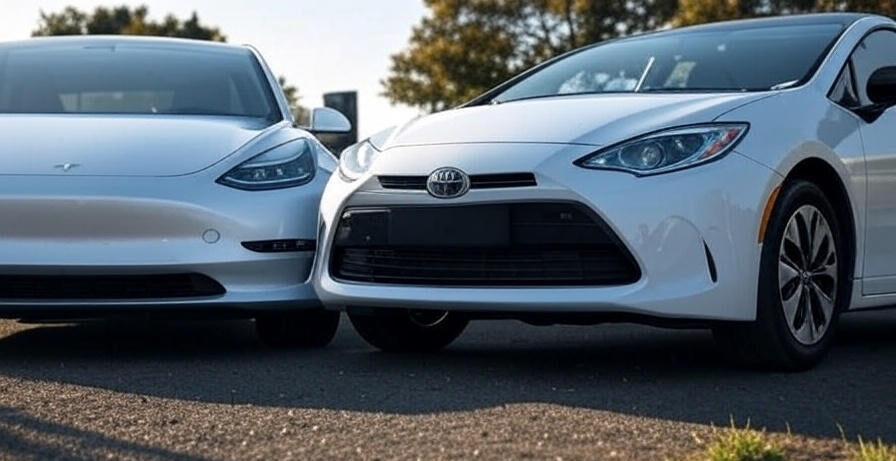Summary: Should You Go Fully Electric or Play It Safe with Hybrid?
Alright buddy, let’s not pretend you haven’t been squinting at those shiny new electric cars and hybrids zoomin’ past gas stations while you stand there, pump in hand, watchin’ the numbers spin like a slot machine you keep losin’. 2025’s here, gas ain’t gettin’ cheaper, and everyone from your eco-friendly cousin to your skeptical uncle’s got an opinion about what’s really the best bang for your buck.
Is it smarter to jump all-in with a zero-gas EV or play it safe with a hybrid that still sips fuel when needed? Well, let’s break it all down: the costs, the secrets dealers won’t spill, the real-life headaches, and the moments you’ll high-five yourself for goin’ green. By the end, you’ll have the info you need to pick the right ride for you — not just what looks good in the neighbour’s driveway.
Why This Debate Even Matters in 2025
So why’s this still a big question, huh? ‘Cause neither side’s perfect.
- EVs: No tailpipe emissions, cheaper to run, fancy tech… but range anxiety is real, chargers can be a pain, and upfront prices still sting.
- Hybrids: Familiar to drive, fuel up anywhere, solid reliability… but you’re still payin’ for gas, and some folks think you’re half-committed to savin’ the planet.
And the biggest thing? Battery tech’s better, but not flawless. Incentives come ‘n go. Gas prices swing like a yo-yo. And what’s “greenest” for one driver might make zero sense for someone else.
What Exactly Is an Electric Car vs a Hybrid Anyway?
Good place to start — because trust me, folks mix this up all the time.
100% Electric Cars
Think Tesla, Nissan Leaf, Ford Mustang Mach-E. These babies run only on electricity. You plug in, charge the battery, and drive. No gas tank, no tailpipe.
Key points:
- Zero tailpipe emissions.
- Quiet ride (so quiet, ya might scare pedestrians).
- Costs less to “fuel” per mile.
- Needs a charger — at home or on the go.
Hybrids
Classic example: Toyota Prius. A hybrid’s got a small battery and a regular gas engine. The car flips between the two — runnin’ on battery for short city trips, then gas when needed.
Key points:
- Better MPG than pure gas cars.
- No need to plug in — the battery recharges through the engine and braking.
- Simple for folks who hate change.
- Not truly “zero emissions.”
Plug-In Hybrids (PHEVs)
The middle child. Bigger battery than a regular hybrid, so you can plug in and drive electric for, say, 20–50 miles. After that? Gas engine kicks in. Think Toyota Prius Prime, Hyundai Ioniq PHEV.
Upfront Costs: Who Hits Your Wallet Harder?
Brace your credit card, friend.
- EVs: Generally pricier upfront — a decent budget EV starts around $30K, but most sit $35K–$60K before incentives.
- Hybrids: More affordable. You’ll see base models from $25K–$35K.
Don’t forget those sweet tax credits. Many EVs still get federal and state perks — up to $7,500 in the US, sometimes more if your local utility feels generous. Regular hybrids? Usually no federal credits, but plug-in hybrids can qualify.
Everyday Running Costs: The Fuel vs. Electric Bill
Here’s where your wallet breathes easy:
- EV: Plug it in at home, pay maybe $0.04–$0.05 per mile. Average drivers spend about $30–$50/month charging at home.
- Hybrid: Still gotta buy gas, but you’ll stretch a tank like taffy — 50+ MPG’s common.
Public fast chargers can cost more — sometimes like payin’ $5–$15 for a full charge. Hybrids? Well, you just top up at the gas station and grumble about prices like always.
Maintenance: Fewer Wrenches in Your Wallet
This one’s clear cut — EVs win.
- EVs: No oil changes, no exhaust, no transmission headaches. Brake pads last longer too.
- Hybrids: Still got a gas engine. You’ll need oil changes, filters, spark plugs, all that jazz.
But both have batteries, and both can sting if the battery conks out early. Luckily, most batteries last 8–10 years with decent care — and warranties got your back.
Range Anxiety: Will You Be Stuck?
The big fear. Nobody wants to be That Guy stuck beggin’ for a wall outlet.
- EVs: Average range these days? 200–350 miles per charge. Long road trips mean plannin’ your charge stops.
- Hybrids: Just drive. If the battery’s drained, the gas tank’s got your back. Plug-in hybrids? You get 20–50 miles electric, then gas takes over.
So, if you’re road-trippin’ a lot or live where chargers are rarer than snow in the Sahara, hybrids might make you sleep easier.
Green Guilt: Who’s the Planet’s Best Friend?
It’s not always black ‘n white.
- EVs: Zero tailpipe emissions. But battery production and disposal have an impact. If your local power grid’s dirty (coal-heavy), that dilutes the “green factor.”
- Hybrids: Better than gas guzzlers. But you’re still burnin’ fuel, just less.
Plug-in hybrids hit the sweet spot if you do lots of short trips — you’ll run electric most of the time, but still have gas for emergencies.

Real-World Example: The Singh Family Showdown
Picture this: the Singh family lives in Delhi outskirts. Dad wants a fully electric Hyundai Kona Electric. Mom says stick with a Toyota Camry Hybrid.
- Dad drives 20 miles to work daily, so charging at home covers 90% of trips.
- Mom worries about holiday road trips to see grandma 400 km away.
End story? They leased a plug-in hybrid. Short trips = electric. Long trips = gas backup. No drama, no stress. And Dad still brags about never pumpin’ gas for weeks.
So… Which Should You Get?
Ask yourself:
✅ Got a garage or driveway for home charging?
✅ Most trips under 40 miles?
✅ Hate the idea of ever pumpin’ gas?
Get an EV.
Or…
✅ Drive a lot of long trips?
✅ Can’t charge at home?
✅ Like the “best of both worlds”?
Go hybrid — or better yet, plug-in hybrid if you’re curious about electric.
Surprising Facts Most Folks Don’t Know
🔋 Fact #1: It’s cheaper to replace a hybrid battery than an EV battery — less capacity = lower cost.
⚡ Fact #2: EVs have instant torque. Even cheap ones feel peppy. Hybrids? More sedate.
🚗 Fact #3: Some plug-in hybrids run electric AC while parked. Campin’? Nap with the AC on — gas cars can’t do that without idling.
💡 Fact #4: Many cities let EVs and plug-in hybrids use carpool lanes solo. Time saved is money saved, my friend.
Q&A: The Stuff You’d Google at 2 AM
1️⃣ Do EVs really cost less to maintain?
Yep! No oil changes, fewer moving parts. You’ll save thousands over 5–10 years.
2️⃣ Are hybrid batteries expensive to replace?
Less than full EV batteries, but still not cheap. Around $2K–$4K is common.
3️⃣ Can I charge my plug-in hybrid at a regular outlet?
Totally. Just slower than a Level 2 charger.
4️⃣ Do hybrids need special gas?
Nope! Just regular unleaded, same as a normal car.
5️⃣ Will an EV save me money if I don’t drive much?
Maybe not. Upfront cost is higher — you save more if you rack up miles.
6️⃣ How long does it take to charge an EV?
Level 2 at home: 4–10 hours. Fast charger? 30–60 mins for 80%.
7️⃣ Can I road trip in an EV?
Absolutely — just plan your chargers. Some folks love it, some hate it.
8️⃣ Are plug-in hybrids worth it?
If you’ve got short daily trips and occasional long drives? Totally.
9️⃣ Do EVs lose range over time?
Yup — about 1–2% per year if treated well. Batteries are gettin’ better every year.
🔟 Is my power bill gonna skyrocket?
Expect an extra $30–$70/month for home charging. Still beats $5/gal gas.
1️⃣1️⃣ What if there’s a blackout?
Hybrid’s got gas backup. EVs? You’re stuck till the grid’s back.
1️⃣2️⃣ Should I wait for better tech?
Batteries improve every year, but don’t wait forever. Today’s EVs are solid already.
Final Thoughts: Choose the Car That Fits Your Life
Look, no car’s perfect. But you’ve got options. Fully electric’s awesome if your lifestyle fits. Hybrids or plug-ins give you a safety net if you’re not ready to kiss gas goodbye. Either way, you’ll save more money than that neighbor stuck pumpin’ 91 octane every week — and the planet’ll thank ya, too.



